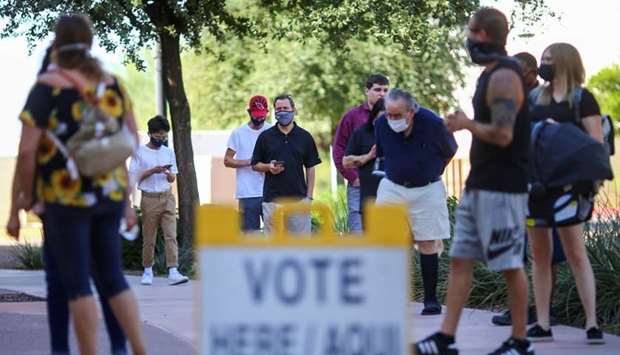US election day is finally here, and 100 million people have already voted by mail or in person.
Millions more were to vote in person on Tuesday, and the winner -- Republican President Donald Trump or Democratic challenger Joe Biden -- won't be known until the evening at the earliest.But the battle to achieve a majority 270 electoral votes, earned by winning the popular vote in individual states, has been so close that knowing the winner could take until into Wednesday or even longer, and lead to legal battles over the vote count.
Numbers start to come in after in-person voting closes at 6:00 pm Eastern Time (EST) (2300 GMT) in parts of two states, and then build as more states stop allowing votes in the hours after.
Most close by 9:00 pm EST, opening the way for a gusher of vote tallies over the following hours, with some districts and states reporting faster than others.
Several, including California, the largest, only close at 11:00 pm EST, and Hawaii and Alaska, small voter-wise, vote until midnight and 1:00 am EST, respectively.
Given that opinion polls already indicate clearly which way 38 of the 50 states will go, the focus is on 12 key states.
The first ones to watch are the eastern states of Georgia, where polls close at 7:00 pm; Florida, where, depending on the district, polls shut at 7:00 pm or 8:00 pm; North Carolina where polls close at 7:30 pm; and the western state of Arizona at 9:00 pm EST.
Based on projections for the "decided" states, it is possible that if Biden captures Florida and two of the above others, he could be judged the overall winner of more than 270 electoral college votes early in the night.
But, using projections, even if Trump wins all of the above four, the overall victor would still be unclear.
Officially, the winner of the White House is not decided until every state has certified its vote count which, given delays for mailed-in ballots, could be a week or more in some places.
But the race is typically "called" by major news organizations on election night, based on their tabulations of reported totals, district by district.
They make a decision on the winner of each state, and finally the entire election, when it appears there is no mathematical way for one candidate to overcome his deficit and the other has a sure path to the magic number of 270 electors.
Ronald Reagan's 1980 landslide victory was called at 8:15 pm EST on election Tuesday (1:15 am GMT Wednesday).
But in 2016, Trump's victory over Hillary Clinton only became clear at about 1:30 am EST Wednesday when tallies showed he had won Pennsylvania. Still, Clinton only conceded an hour later after Wisconsin fell to Trump.
And in 2000, the election came down to who won Florida, where the candidates were divided by a few hundred votes. The two parties battled for weeks legally until the Supreme Court weighed in and halted recounts, handing the election to George W. Bush.
It could be 11:00 pm EST or earlier if Biden sweeps the first key states reporting.
If not, the timing will depend on how subsequent key states fall. And that could be drawn out.
In addition, snafus could delay reporting. North Carolina's election board announced Tuesday afternoon that voting would be extended in four districts because of technical problems, delaying the release of state tallies at least 45 minutes.
In Pennsylvania and Michigan, two prized battlegrounds, slow counting of a gusher of mail-in votes could delay the results for several days.
In fact, both parties have geared up for legal fights in several states where a favorable court judgment could tilt the results one way or another.
In Pennsylvania, Republicans are prepared to litigate a state decision to accept mail-in ballots that arrive up to three days after Tuesday. With Democrats more likely to vote by mail than Republicans, they want those ballots nullified.
In Washington a voter group told a judge that the US Postal Service may have lost 300,000 ballots and its deliveries of ballots had slowed, leaving them at risk of not being counted.
In Texas Republicans are seeking to invalidate 127,000 votes in a Democrat stronghold because they took place in drive-thru tents allegedly not permitted under state rules.
And in a heavily Democratic district in Nevada, Republicans have sought to halt the counting of mail-in votes to be able to more closely examine them, with an eye to throwing some out.

